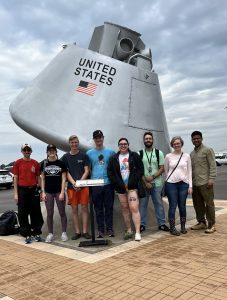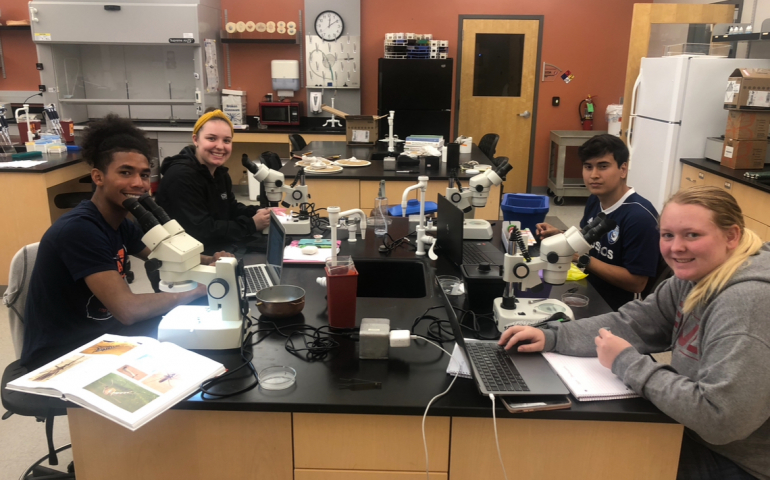This year, SNU is holding another prestigious summer research experience program! Summer research has been continuing since the summer of 2009, making this the fifteenth year of the program. The 2024 SNU Summer Research Experience (SRE) will run from May 16 to June 27, 2024. Students will learn alongside faculty mentors about research techniques, ethics, fieldwork, and more. Current SNU students who have chosen an academic major in biology, chemistry, computer science, or mathematics are eligible to apply for this exciting opportunity.
There will be five research projects for students to participate in this summer. One project students can work on is Mosquito-borne disease surveillance in Oklahoma (MODSO) with Dr. Caio França. When asked about his research Dr. França said, “Our goals are to (i) assess the correlation between environmental factors, mosquito surveillance, and epidemiological data; (ii) use geographical information system maps to understand mosquito vector ecology in central Oklahoma; (iii) utilize NASA earth observations in an early-warning system for the WNV disease outbreak in Oklahoma.”
The next project students can participate in is Factors that Affect Terrestrial Mammal Distributions with Dr. Daniel Rocha. Dr. Rocha described his research by saying, “We will use already collected camera trap data from the Oklahoma City Metro area, combined with NASA-derived earth observation data (e.g., satellite), to identify the main factors that influence patterns in mammal (and possibly bird) distributions. This project also aims to equip undergraduate students with the basic knowledge and tools to process and use spatial data in independent ecological research. Importantly, we want these tools to be available to the students when they no longer have access to the university resources. Therefore, we will use only free source and open software (mainly QGIS and R) during data processing and analysis.”
Another interesting research project being offered this summer is “Comparison of analytical methods for measuring chlorophyll and CDOM” with Dr. Shawna York. She said, “In this project, we will compare spectroscopic and chromatographic methods of analysis for specificity and sensitivity. Of particular interest in the comparison is the sample preparation time and cost, as well as comparisons of the hazards of the sample treatment methods.”
Students can also work with Dr. Nicholas Zoller who is researching, SNU Chapel Attendance Patterns. Dr. Zoller explains, “We will make data displays to summarize what we find and use statistical tests to measure how much different groups of students differ in their chapel attendance patterns. Finally, we will present our findings to the Office of Spiritual Life to help it plan for future chapel offerings.”
A final research opportunity students have is to work alongside Dr. Rusiri Rathnasekara on her project, “Synthesis and Characterization of ZnO Nanoparticles via Microwave Method,” with the primary objective of undertaking the synthesis and characterization of ZnO nanoparticles, utilizing an innovative microwave method. Dr. Rathnasekara stated, “This research aims to delve into the intricacies of nanoparticle synthesis, contributing valuable insights to the field of physics and materials science.”

Former SRE participant and current Biology Lab Manager, Natalie Shreffler, spoke fondly about her experience, stating, “There is a lot of maturity that comes with working on a project with multiple people. With SRE, you’re going to be presenting research, which can be scary, but I think having that kind of exercise really helped me grow.” She offered some advice for new participants who might be looking to join this summer, saying, “Never forget that you’re here to learn. If you can’t do something yet, don’t get frustrated because this is going to be part of the experience. Oftentimes, you can forget that fact, but take it easy on yourself and keep putting a lot of effort into it. Soon you will see the payoff.”
Dr. Nicholas Zoller gave insight on what he hopes to accomplish this year, stating, “We want primarily professional growth for the students and growth in their knowledge about their disciplines. That builds confidence for graduate school and future careers.” One of Dr. Zoller’s reasons for teaching at SNU is the fact that he gets to figure out how Christianity and research pair together. He added that “it builds character traits and develops humility.” Dr. Zoller has served as the SRE director since the summer of 2012. He extends his gratitude to those who have served before him, such as Dr. Mark Winslow. He went on to explain that he is grateful that serving as a faculty mentor has forced him to branch out from his Ph.D. dissertation and dive into research about other fascinating mathematics. Most importantly, he finds that working with students each summer helps make him a better teacher, Christian, and person. He said, “The more I do this, the more I pay attention to my student researchers as whole persons who have rich lives beyond our interactions around our summer research project. I’ve been especially humbled by hearing some of their Christian testimonies. God is doing good things in the lives of faculty mentors and student researchers each summer in the SRE.”
Each SRE Participant will receive a $3,000 stipend and have access to SNU housing at no cost. Participants are expected to devote 40 hours of research per week, as determined by the research adviser, typically from 8:00 a.m. to 5:00 p.m., Monday through Friday. Furthermore, participants have to showcase the results of their research in two different settings during the 2024–2025 academic year.
The SRE program is co-sponsored by SNU and the Oklahoma NASA Space Grant Consortium (OSGC) and is not made possible without their help. If any students are interested in the program, you can reach out to Dr. Zoller by phone, email at nzoller@snu.edu, or swing by his office in Beaver Science 202D. Applications are due March 8, 2024, and can be found at snu.edu/summer-research/
Featured photo by Dr. Nicholas Zoller
